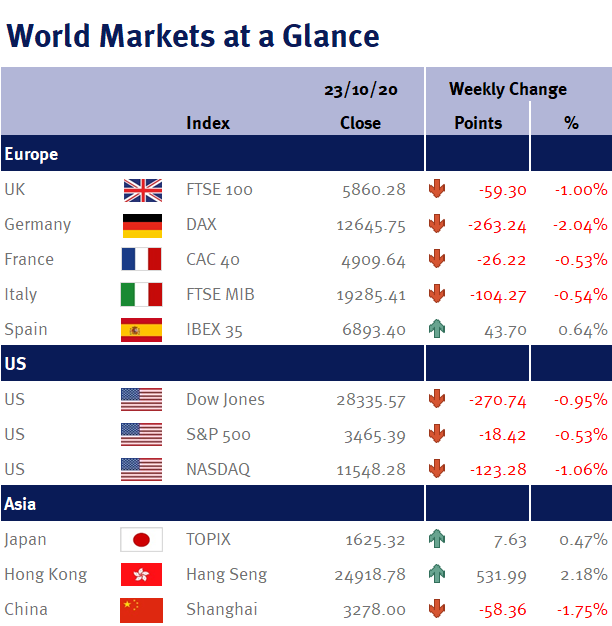As you can see from the accompanying table, overall it has been a mixed week: while US equity markets rose slightly, UK and European equity markets ended the week lower.
This differential is predominately thanks to new localised coronavirus lockdowns after new daily infections nearly touched 140,000 yesterday (Thursday 15 October 2020).
However, while these dark clouds remain hanging over us, it is worth remembering the resilience of the US economy and equity markets over the summer when their daily new cases were consistently running at over 70,000. As such we believe that the UK and Europe should also be strong enough to withstand the new lockdown measures.
The FTSE-100 was among the worst performing equity markets due to a lack of progress in Brexit talks – although, the Footsie actually rose strongly today (Friday 16 October 2020 – with the FTSE-100 up 87 points or 1.49%) after Boris Johnson announced that talks between the UK and EU over a post-Brexit trade agreement were over.
However (and unsurprisingly), this is unlikely to be the end of the Brexit-saga, as Ursula von der Leyen, the President of the European Commission, tweeted that an EU “negotiation team will go to London next week [w/c 19 October 2020] to intensify negotiations”.
While speculation has now turned from a “Canada- style” relationship, to a far less comprehensive one that is similar to the EU’s with Australia, this is effectively a no-deal Brexit as the bulk of their trade is done on World Trade Organisation (WTO) rules – and if tariffs are imposed, it means that UK exporters could lose some of their competitiveness, while we (UK consumers) could face higher prices for European goods. However, it should be noted that the tariffs imposed by both the US and China over the past two years during their trade war did result in a small reduction in trade, it didn’t significantly impact prices/inflation as many companies absorbed the costs of the tariffs by reducing the prices of their exports.
There are also plenty of reasons to be positive on UK equities: having fallen by 21.52% since the start of the year, UK equities have attractive valuations (low price-to-earnings multiples and an attractive dividend yield). Furthermore, after a spate of coronavirus induced dividend cuts and cancellations, many companies are starting to restart or increase their payments.
In the US there was something for everyone depending on whether you view the glass as half full or half empty.
The chances of a new fiscal stimulus deal being agreed before the Presidential election on 3 November 2020 are now nigh on impossible and slim to say the least before the Presidential inauguration on 20 January 2021. However, US consumers clearly aren’t running out of money as US retail sales smashed expectations by growing 1.9% in September.
Additionally, while US initial jobless claims rose (which is negative) to 898,000 from 840,000 the previous week, US continuing jobless claims were substantially lower (which is positive) at just over 10m versus 11m the week before.
Looking ahead to this coming week, in the US we have housing data, the Fed’s Beige Book, weekly jobless claims and PMI data. In the UK we have CPI inflation, retail sales and PMI data; in Europe we have consumer confidence and PMI; and from China we have Q3 GDP, industrial production and retail sales.
Investment Management Team


